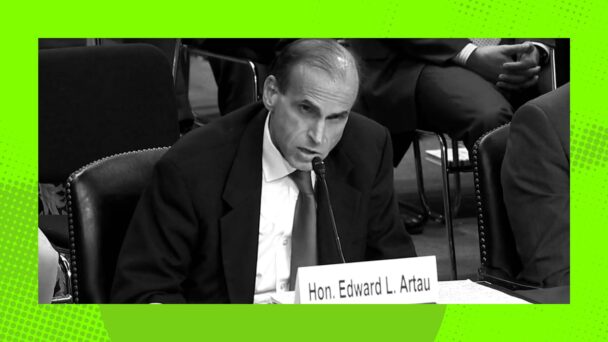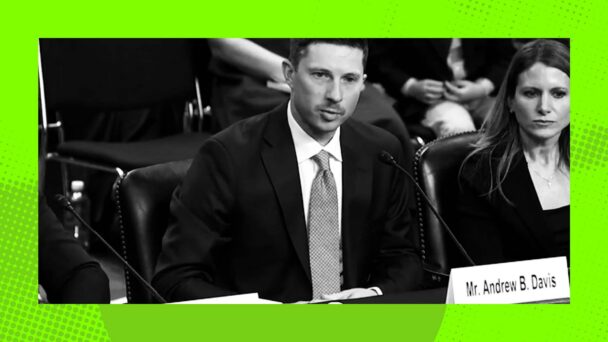As the Supreme Court continues to clear all obstacles to President Donald Trump’s agenda, Trump is continuing his crusade to stack the federal courts with an even more extreme brand of judge: those that are loyal to him above all else. On Wednesday, the Senate Judiciary Committee heard from Trump’s second batch of judicial nominees, including his most brazen pick yet.
Vacancies
The judicial vacancy count has held steady at 61 (49 current and 12 future) for more than two months. Trump has 12 nominees pending in the Senate, 10 of whom have had their Judiciary Committee hearing.
At the same point during President Joe Biden’s first year, there were 110 total vacancies (81 current and 29 future), with 17 nominees pending and 7 judges already confirmed, including future Supreme Court Justice Ketanji Brown Jackson to the D.C. Circuit.
Nominees
On June 18, Trump announced his intent to nominate anti-abortion lawyer Chad Meredith to a federal district court judgeship in Kentucky. The nomination is a rare second bite at the apple for Meredith, whom Biden nearly nominated to the federal bench back in 2022. We’ll get to that debacle in a moment.
Like most Trump appointees, Meredith’s resume is the stuff of progressive nightmares. A longtime member of the Federalist Society, Meredith began his career by clerking for two conservative federal judges, including Clarence Thomas fanboy Judge Amul Thapar, whom Trump elevated to the Sixth Circuit during his first term.
As deputy counsel to Kentucky’s Republican governor, Matt Bevin, and then as Solicitor General under Republican Attorney General Daniel Cameron, Meredith fought hard to make life worse for just about everyone. He defended numerous anti-abortion laws and actions, including a law that required doctors to perform an ultrasound and describe the image to the patient before performing an abortion. He stuck it to labor unions by defending Kentucky’s “right-to-work” law, which exempted workers from the fees necessary to help unions collectively bargain for fair wages and treatment. And of course, no modern-day culture warrior’s résumé would be complete without some good old-fashioned COVID denialism: After unsuccessfully challenging Democratic Governor Andy Beshear’s emergency orders in response to the pandemic, Meredith defended the legislature’s new law stripping the governor of those same emergency powers.
Given all that, it came as a major shock that Biden—yes, Democratic President Joe Biden—came within hours of nominating Meredith to the bench in 2022, as part of some unholy deal with Kentucky Republican Senator Mitch McConnell over pending appointments requiring Senate confirmation. In exchange for Biden nominating Meredith, McConnell agreed to let Biden appoint two U.S. Attorneys in Kentucky without Republican resistance, according to Slate. (McConnell had also engineered the vacancy that Meredith would fill, convincing sitting district judge Karen Caldwell to retire on the condition that a conservative replace her.)
If that sounds like a shitty deal, that’s because it is. But before the announcement was made, the Supreme Court overturned Roe v. Wade, which put Biden in a bind: It would have been an awful look for Biden, who said hours after the Dobbs decision that he would “do all in my power to protect a woman’s right” to choose, to nominate someone with such a vigorous anti-choice record. A few weeks later, Biden was bailed out by Kentucky’s other Republican senator, Rand Paul. who refused to return a blue slip for Meredith, complaining that McConnell had cut him out of the selection process.
There’ll be no such luck this time: Paul’s office already told the Louisville Courier Journal that he “gladly recommended” Meredith, and “looks forward to voting for him in the Senate.”
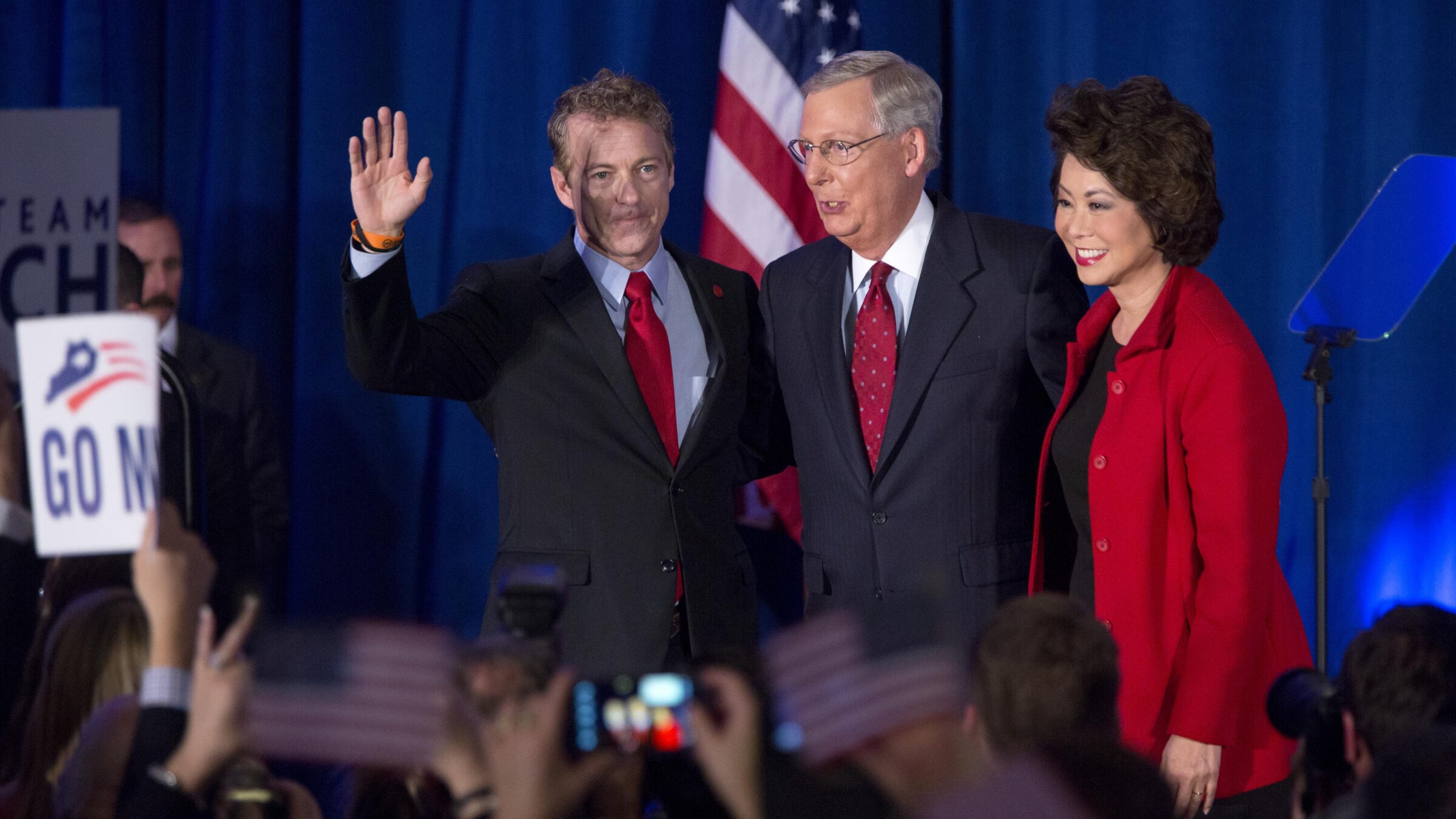
(Photo by Aaron P. Bernstein/Getty Images)
Hearings
After a lackluster performance at the hearing for Trump’s first batch of nominees earlier this month, Democrats on the Senate Judiciary Committee showed up Wednesday much more prepared. And with good reason: The spotlight was on Third Circuit nominee Emil Bove, Trump’s former criminal defense attorney and current Department of Justice enforcer whose primary qualification for this judgeship is his unyielding fealty to the president.
Over the course of three hours, Democratic senators repeatedly pressed Bove on the myriad red flags in his file, including the overwhelming evidence of his lack of temperament and character while serving as a federal prosecutor in New York; his politically-motivated firings of prosecutors and FBI agents involved in January 6 prosecutions at Trump’s behest; and his failed quid pro quo deal to drop the otherwise meritorious prosecution of New York Mayor Eric Adams. On top of all that, Democrats also asked about newly released whistleblower allegations that at the Department of Justice, Bove was willing to defy court orders, and went so far as to allegedly tell other DOJ lawyers to tell “the courts ‘fuck you.’”
Bove offered little substance in response. With the blessing of the committee’s chairman, Iowa Republican Senator Chuck Grassley, Bove refused to answer questions about most of what he did at the Justice Department. He acknowledged that he told DOJ lawyers to “fight hard” for the Trump administration, and often “conveyed the importance” of keeping Trump’s deportations to foreign gulags moving. But when asked specifically if he ever told anyone at DOJ to say “fuck you” to a court order, he said he couldn’t recall.
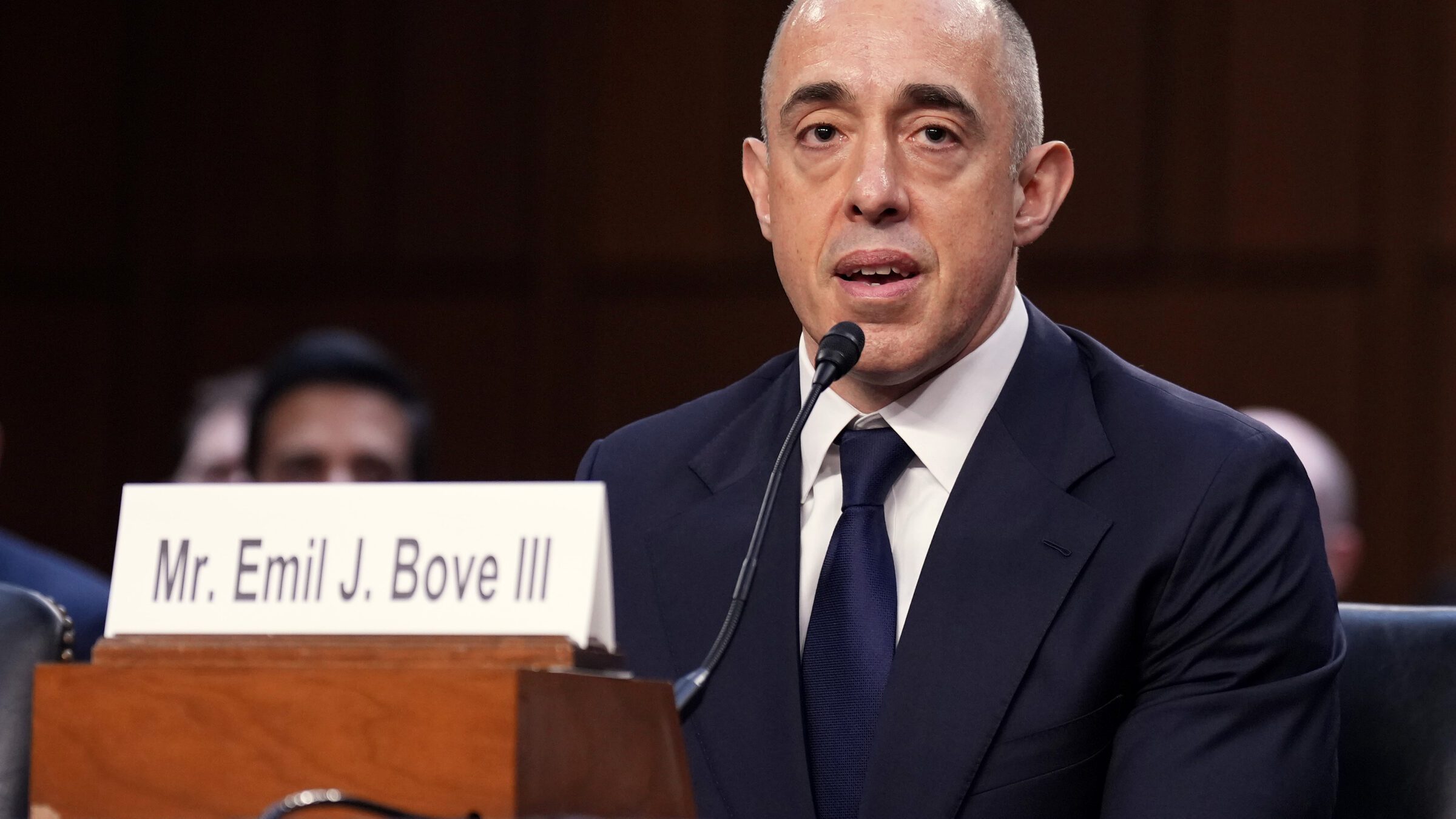
(Photo by Kevin Dietsch/Getty Images)
To his credit, New Jersey Senator Cory Booker pressed Bove about statements he allegedly made when searching for someone at the Justice Department to sign the papers seeking dismissal of the Adams indictment. Bove gave a series of unequivocal “no” answers, which prompted Booker to suggest that he would seek evidence that Bove had lied under oath. California Senator Adam Schiff similarly told Bove that he would seek his notes from various meetings to see if they were consistent with his answers before the committee.
There was perhaps one moment when Bove’s facade cracked. Vermont Senator Peter Welch asked Bove who won the 2020 election, and Bove parroted the standard Republican answer: that Joe Biden was “certified as the winner.” But he took pains to avoid saying that Trump lost, characterizing the facts of Biden’s popular vote and Electoral College victories as “political,” and therefore off-limits. When asked how the vote tallies could be “political,” Bove paused, and said sheepishly that he was “just trying to be precise.” I’d be curious whether any of Trump’s nominees would describe the outcomes of the 2016 or 2024 elections in the same way—perhaps someone will ask next time.
Clip via YouTube
In the end, the only thing Bove was really willing to say was that everything ever said about him by his critics—including former colleagues, defense attorneys against whom he practiced, and judges before whom he appeared, who variously described him as vindictive, mean-spirited, and unprofessional—was wrong. Even conservatives find his temperament disqualifying: Former Republican Judiciary Committee Counsel Gregg Nunziata sent the Committee a letter calling Bove’s hatchetwork at DOJ “deeply incompatible with a lifetime appointment to federal judicial service.” Ed Whelan, who writes a column called “This Day in Liberal Judicial Activism,” called Bove a “bully” and said that he lacked “the character and integrity to be worthy of confirmation as a federal judge.” But hey, at least Alan Dershowitz likes him!
If you thought any of this would make a lick of difference to Committee Republicans, you were very, very wrong. Not a one seemed to have any concern about anything Bove had done, and had little interest in doing anything other than complaining about how Democrats and the media had treated him. I know the cynicism of the modern Republican senator knows no bounds, but this was particularly egregious given the racist, Islamophobic smear campaign these very same senators launched against Biden’s nominee for this same seat, Adeel Mangi.
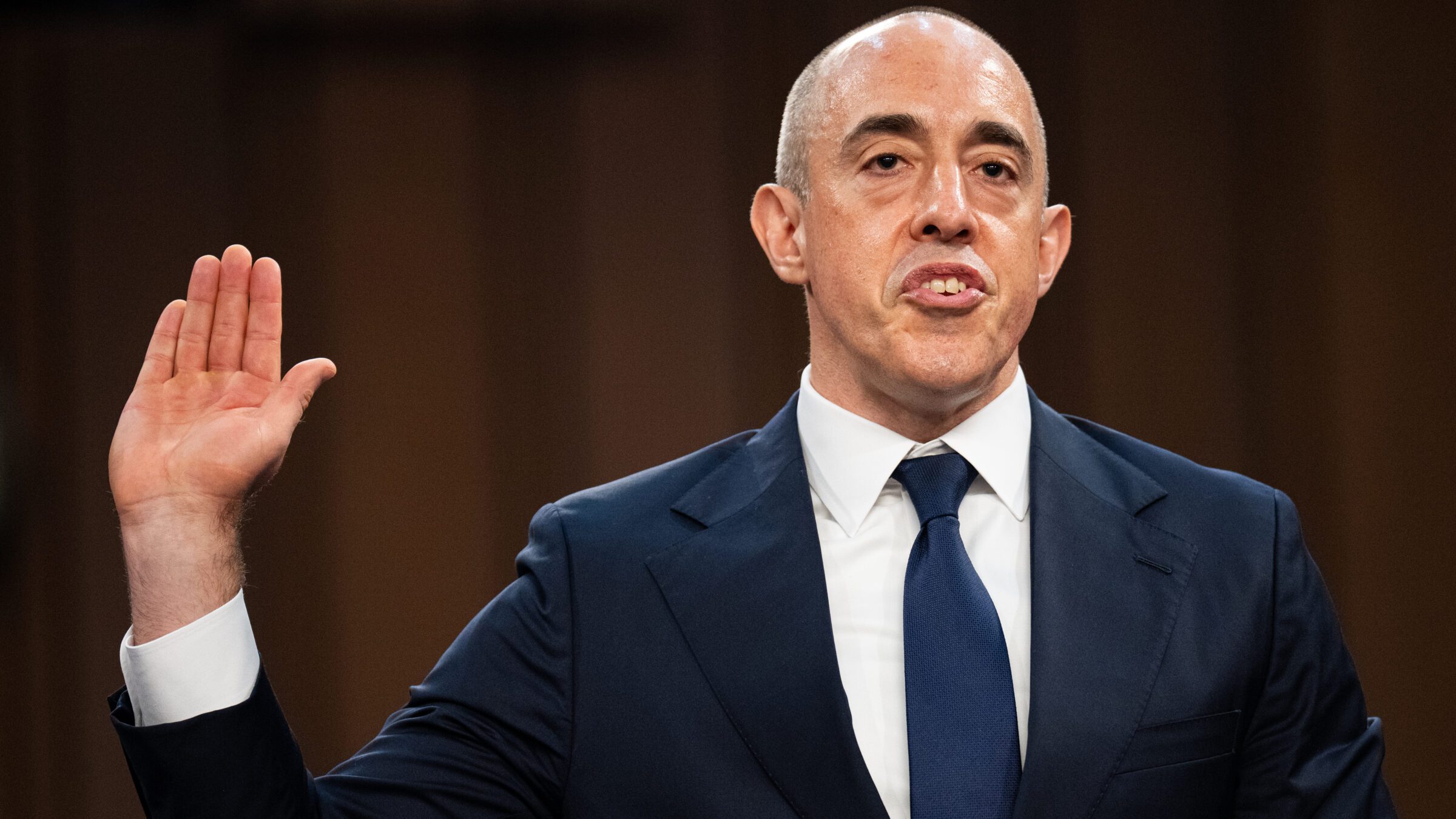
(Bill Clark/CQ-Roll Call, Inc via Getty Images)
When the time came to hear from four district court nominees in Florida, Connecticut Senator Richard Blumenthal pressed Florida state court judge Ed Artau about a Politico report that he was lobbying for a nomination while hearing Trump’s defamation lawsuit against the Pulitzer Prize Board. Artau tied himself in knots to avoid giving a clear answer about whether he had been in touch with Florida Senator Rick Scott’s office before he wrote a gratuitous concurring opinion in Trump’s favor, but eventually conceded that he had. Senators Dick Durbin and Sheldon Whitehouse focused their energy on Jordan Pratt, the 30-something former Claremont Institute fellow who had recently ruled that a decades-old Florida law that permitted minors to get an abortion without parental consent is unconstitutional.
All four district court nominees—and every other nominee to appear before the Committee except Bove—disclosed in their Committee Questionnaires that they all interacted with Trump before their selection, some in person and some by phone. That level of presidential involvement with lower court nominations—especially district court nominations—is unprecedented, but is consistent with a president who needs to assure himself of his nominees’ personal loyalty before making his picks.
On Thursday morning, the Judiciary Committee voted along party lines to advance the nominations of Whitney Hermandorfer to the Sixth Circuit, and Josh Divine, Maria Lanahan, Zachary Bluestone, and Cristian Stevens to Missouri district courts. The Senate is in recess for the Fourth of July next week, but Republicans could start the confirmation process on these nominees as early as the week of July 7.
Meredith and another Florida district court nominee, John Guard, will likely appear before the Committee sometime in mid-July, and Trump has until July 2 to announce more nominees if he wants another hearing before the August recess.


